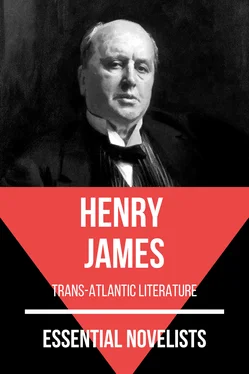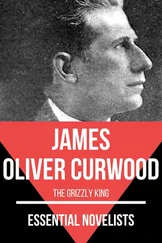“It was a pleasure to me, and I liked the way he listened. I could have talked a long time to such a listener; he was so quiet, so intense; he drank it all in.”
“What did you say about me?” Isabel asked.
“I said you were on the whole the finest creature I know.”
“I’m very sorry for that. He thinks too well of me already; he oughtn’t to be encouraged.”
“He’s dying for a little encouragement. I see his face now, and his earnest absorbed look while I talked. I never saw an ugly man look so handsome.”
“He’s very simple-minded,” said Isabel. “And he’s not so ugly.”
“There’s nothing so simplifying as a grand passion.”
“It’s not a grand passion; I’m very sure it’s not that.”
“You don’t say that as if you were sure.”
Isabel gave rather a cold smile. “I shall say it better to Mr. Goodwood himself.”
“He’ll soon give you a chance,” said Henrietta. Isabel offered no answer to this assertion, which her companion made with an air of great confidence. “He’ll find you changed,” the latter pursued. “You’ve been affected by your new surroundings.”
“Very likely. I’m affected by everything.”
“By everything but Mr. Goodwood!” Miss Stackpole exclaimed with a slightly harsh hilarity.
Isabel failed even to smile back and in a moment she said: “Did he ask you to speak to me?”
“Not in so many words. But his eyes asked it—and his handshake, when he bade me good-bye.”
“Thank you for doing so.” And Isabel turned away.
“Yes, you’re changed; you’ve got new ideas over here,” her friend continued.
“I hope so,” said Isabel; “one should get as many new ideas as possible.”
“Yes; but they shouldn’t interfere with the old ones when the old ones have been the right ones.”
Isabel turned about again. “If you mean that I had any idea with regard to Mr. Goodwood—!” But she faltered before her friend’s implacable glitter.
“My dear child, you certainly encouraged him.”
Isabel made for the moment as if to deny this charge; instead of which, however, she presently answered: “It’s very true. I did encourage him.” And then she asked if her companion had learned from Mr. Goodwood what he intended to do. It was a concession to her curiosity, for she disliked discussing the subject and found Henrietta wanting in delicacy.
“I asked him, and he said he meant to do nothing,” Miss Stackpole answered. “But I don’t believe that; he’s not a man to do nothing. He is a man of high, bold action. Whatever happens to him he’ll always do something, and whatever he does will always be right.”
“I quite believe that.” Henrietta might be wanting in delicacy, but it touched the girl, all the same, to hear this declaration.
“Ah, you do care for him!” her visitor rang out.
“Whatever he does will always be right,” Isabel repeated. “When a man’s of that infallible mould what does it matter to him what one feels?”
“It may not matter to him, but it matters to one’s self.”
“Ah, what it matters to me—that’s not what we’re discussing,” said Isabel with a cold smile.
This time her companion was grave. “Well, I don’t care; you have changed. You’re not the girl you were a few short weeks ago, and Mr. Goodwood will see it. I expect him here any day.”
“I hope he’ll hate me then,” said Isabel.
“I believe you hope it about as much as I believe him capable of it.”
To this observation our heroine made no return; she was absorbed in the alarm given her by Henrietta’s intimation that Caspar Goodwood would present himself at Gardencourt. She pretended to herself, however, that she thought the event impossible, and, later, she communicated her disbelief to her friend. For the next forty-eight hours, nevertheless, she stood prepared to hear the young man’s name announced. The feeling pressed upon her; it made the air sultry, as if there were to be a change of weather; and the weather, socially speaking, had been so agreeable during Isabel’s stay at Gardencourt that any change would be for the worse. Her suspense indeed was dissipated the second day. She had walked into the park in company with the sociable Bunchie, and after strolling about for some time, in a manner at once listless and restless, had seated herself on a garden-bench, within sight of the house, beneath a spreading beech, where, in a white dress ornamented with black ribbons, she formed among the flickering shadows a graceful and harmonious image. She entertained herself for some moments with talking to the little terrier, as to whom the proposal of an ownership divided with her cousin had been applied as impartially as possible—as impartially as Bunchie’s own somewhat fickle and inconstant sympathies would allow. But she was notified for the first time, on this occasion, of the finite character of Bunchie’s intellect; hitherto she had been mainly struck with its extent. It seemed to her at last that she would do well to take a book; formerly, when heavy-hearted, she had been able, with the help of some well-chosen volume, to transfer the seat of consciousness to the organ of pure reason. Of late, it was not to be denied, literature had seemed a fading light, and even after she had reminded herself that her uncle’s library was provided with a complete set of those authors which no gentleman’s collection should be without, she sat motionless and empty-handed, her eyes bent on the cool green turf of the lawn. Her meditations were presently interrupted by the arrival of a servant who handed her a letter. The letter bore the London postmark and was addressed in a hand she knew—that came into her vision, already so held by him, with the vividness of the writer’s voice or his face. This document proved short and may be given entire.
My Dear Miss Archerspan—I don’t know whether you will have heard of my coming to England, but even if you have not it will scarcely be a surprise to you. You will remember that when you gave me my dismissal at Albany, three months ago, I did not accept it. I protested against it. You in fact appeared to accept my protest and to admit that I had the right on my side. I had come to see you with the hope that you would let me bring you over to my conviction; my reasons for entertaining this hope had been of the best. But you disappointed it; I found you changed, and you were able to give me no reason for the change. You admitted that you were unreasonable, and it was the only concession you would make; but it was a very cheap one, because that’s not your character. No, you are not, and you never will be, arbitrary or capricious. Therefore it is that I believe you will let me see you again. You told me that I’m not disagreeable to you, and I believe it; for I don’t see why that should be. I shall always think of you; I shall never think of any one else. I came to England simply because you are here; I couldn’t stay at home after you had gone: I hated the country because you were not in it. If I like this country at present it is only because it holds you. I have been to England before, but have never enjoyed it much. May I not come and see you for half an hour? This at present is the dearest wish of yours faithfully,
Caspar Goodwood.
Isabel read this missive with such deep attention that she had not perceived an approaching tread on the soft grass. Looking up, however, as she mechanically folded it she saw Lord Warburton standing before her.
––––––––

SHE PUT THE LETTER into her pocket and offered her visitor a smile of welcome, exhibiting no trace of discomposure and half surprised at her coolness.
Читать дальше













